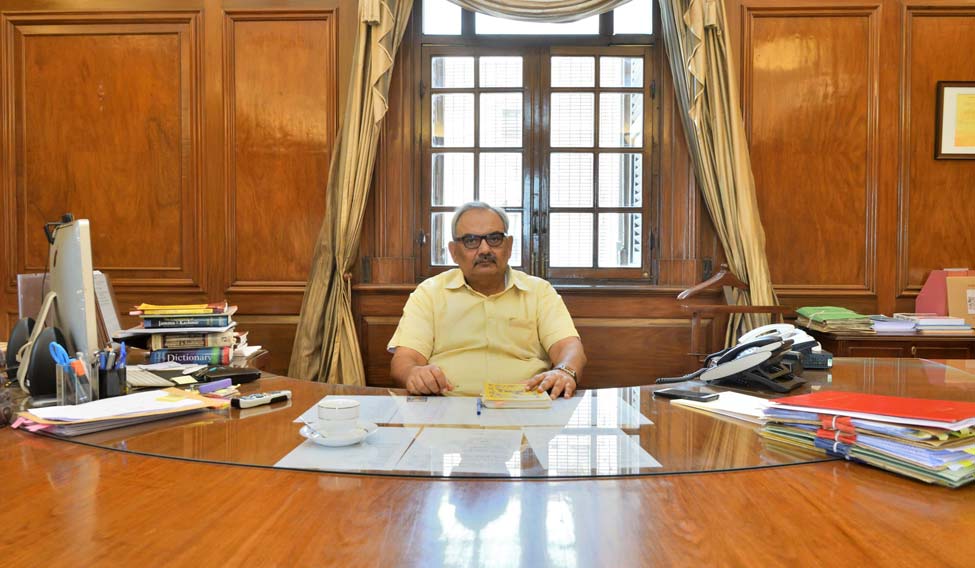The terror siege at the Pathankot airbase in January 2016 was one of the biggest terror strikes during the Narendra Modi-regime. It gave shaky moments to many, including the outgoing Union home secretary Rajiv Mehrishi who retired on Thursday.
“I personally feel I could have done a better job,” says Mehrishi about his stint at the home ministry and feels he was lucky to have continued as the home secretary for a full two-year tenure. His predecessors L.C. Goyal and Anil Goswami had to exit office within months of the NDA government coming to power.
In an interview with THE WEEK, Mehrishi reminisces his tenure at the home ministry. Excerpts:
You were the third home secretary under the NDA regime. Two of your predecessors, L.C. Goyal and Anil Goswami, left within months even though the home secretary gets a fixed two year tenure.
To the best of my knowledge, both my predecessors took voluntary retirement. Normally, these things don't happen but people have an option of exiting government. But I stuck on, and I guess I am lucky.
You managed to steer the home ministry quietly without any major controversies. Coming from the finance ministry with, I suppose, little experience of a home department, how did you manage?
Technically, I did have a short stint as deputy secretary in the home department in Rajasthan and I am talking about the year 1984-85, which was a difficult year. It is kind of you to say that I did this peacefully. But I personally feel I could have done a better job.
Which was your most memorable moment as home secretary?
It has been a great learning process. It has given me exposure to areas which I had not been to otherwise. I think my most memorable moment is the quick and effective decision taken by the NSA in the Pathankot incident, which actually prevented a bigger catastrophe from taking place. The NSG was there before the attack actually took place.
And the toughest moment?
Home ministry every day, every hour and every minute is tough. It is difficult to identify a single moment.
There has been many instances of reshuffling of top bureaucrats in your ministry. The joint secretaries and others act as the memory banks for the ministry. Your comments.
This is a large ministry with 20 joint secretaries and four additional secretaries. So, when there are frequent transfers in and out of the ministry, it necessitates changes in the ministry. In any case, memory has to be institutional in nature. It is not individual-based. It is in the files.
In the past two years, has the security situation improved or deteriorated in the country?
I would say that in several areas it has improved like in the northeast and Left-wing extremism areas. In some other areas, it might be a little different. I would say it is a balance of both, but it is definitely stable and improving.
The security situation has visibly deteriorated in Jammu and Kashmir. Don't you think it is time for some kind of a 'political' dialogue in Kashmir?
That is not for me to comment upon. You have used the right word, so that is a decision at the 'political' level. Home Minister Rajnath Singh has repeatedly said he is willing to talk to anyone who wants to talk to him. He has even visited Kashmir twice. A lot of people came to meet him but some did not. So even at the political level, the signaling is quite clear that the government is not saying no to anybody.
What are the top security challenges the country is facing today?
Terrorism is the single biggest threat to internal security anywhere in the world, including India. There are challenges we keep in mind that are posed by law and order issues, crime and dissatisfaction that people have from time to time. But considering the hostility of our neighbour on the Western front, I think India is quite a secure country as evidenced by the fact that other than the Pakistan-sponsored attacks in Pathankot, Uri and Nagrota, there has been no other major instance of terror in the country in the past two to three years.
Was the home ministry in the loop on the framework of agreement signed between the government and the biggest Naga insurgent outfit NSCN (IM). What are your views on a possible final resolution to the Naga problem?
There is an interlocutor (Naga interlocutor R.N. Ravi) who is handling it on a day-to-day basis. So, overall the home ministry is aware of the direction in which the talks are proceeding and the stage of the talks. I would say when you are doing accords like these, it is a painstaking and long process. So giving a time frame is not possible. The attempt is to reach some conclusion that is satisfactory and any undue hurry will actually jeopardize a satisfactory solution.
Liquor baron Vijay Mallya left the country despite a look out circular against him some months back that generated quite a controversy. Where was the lapse?
The home ministry handles immigration and he left the country on valid documents. So, I can tell you there was no lapse on part of Bureau of Immigration.
There has been a crackdown on foreign-funded NGOs during your tenure. What prompted it?
The foreigners division of the home ministry had some problems, including that of systems. We have tried to improve those systems and, I think, today we are better placed to handle issues related to the Foreign Contribution Regulation Act (FCRA) than a year ago. Action is taken wherever corruption has come to our notice. The CBI also registered a case against an officer and some others.





